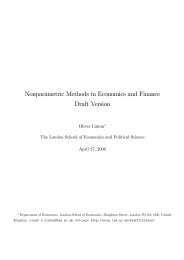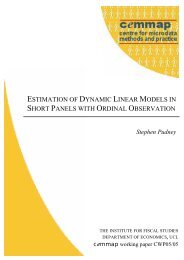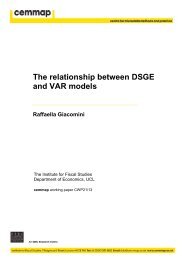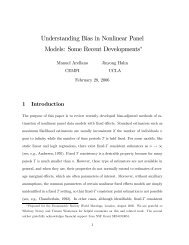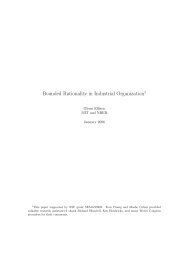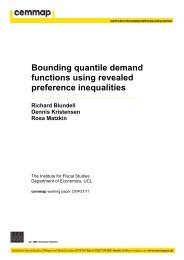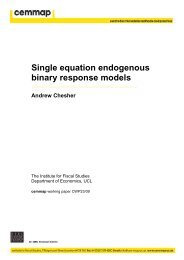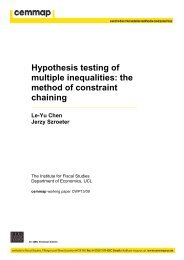- Page 1:
Family Economics Martin Browning Pi
- Page 4 and 5:
iv 3.2 Householdproduction ........
- Page 6 and 7:
vi 6.4 IntertemporalBehavior ......
- Page 8 and 9:
viii 11 Marriage, Divorce, Children
- Page 11 and 12:
List of Figures 1.1 Marriage Rates
- Page 13 and 14:
xiii 4.2 Apotentiallycompensatingva
- Page 16 and 17:
Introduction The existence of a nuc
- Page 18 and 19:
two distinct solution concepts; one
- Page 20 and 21:
were affectedbytherisinginvestments
- Page 22 and 23:
Murat Iyigun, Guy Lacroix, Valérie
- Page 24:
Part I Models of Household Behavior
- Page 27 and 28:
14 1. Facts there appear to be age,
- Page 29 and 30:
16 1. Facts 1.1.4 Transitions The m
- Page 31 and 32:
18 1. Facts sumption goods within h
- Page 33 and 34:
20 1. Facts may not capture the ful
- Page 35 and 36:
22 1. Facts This process is driven
- Page 37 and 38:
24 1. Facts 1.4 Children Children a
- Page 39 and 40:
26 1. Facts a major policy concern
- Page 41 and 42:
28 1. Facts have means for, say, hi
- Page 43 and 44:
30 1. Facts [21] Michael, Robert,
- Page 45 and 46:
32 1. Facts Age group USA Denmark 1
- Page 47 and 48:
34 1. Facts Birth cohort 1931-36 19
- Page 49 and 50:
36 1. Facts USA Canada UK Norway Ye
- Page 51 and 52:
38 1. Facts Country Male Participat
- Page 53 and 54:
40 1. Facts Mother’s Age 20-30 31
- Page 55 and 56:
42 1. Facts rate per 1000, 20+ 18 1
- Page 57 and 58: 44 1. Facts Marriage rate per 1000
- Page 59 and 60: 46 1. Facts percent entering first
- Page 61 and 62: 48 1. Facts percent entering divorc
- Page 63 and 64: 50 1. Facts 100% 90% 80% 70% 60% 50
- Page 65 and 66: 52 1. Facts 1 0.8 0.6 0.4 0.2 0 23
- Page 67 and 68: 54 1. Facts 0.8 0.6 0.4 0.2 0 23 25
- Page 69 and 70: 56 1. Facts 0.8 0.6 0.4 0.2 0 1968
- Page 71 and 72: 58 1. Facts 6.8 6.6 6.4 6.2 6 5.8 2
- Page 73 and 74: 60 1. Facts 0.4 0.2 0 -0.2 -0.4 196
- Page 75 and 76: 62 1. Facts 0.6 0.4 0.2 0 1968 1970
- Page 77 and 78: 64 1. Facts FIGURE 1.23. Age Pyrami
- Page 79 and 80: 66 1. Facts 0.6 0.4 0.2 0 1930 1933
- Page 81 and 82: 68 1. Facts 100% 80% 60% 40% 20% 0%
- Page 83 and 84: 70 1. Facts 0.35 0.3 0.25 0.2 0.15
- Page 85 and 86: 72 1. Facts 100% 80% 60% 40% 20% 0%
- Page 87 and 88: 74 1. Facts Average number of child
- Page 89 and 90: 76 1. Facts Age 28 27 26 25 24 23 1
- Page 91 and 92: 78 1. Facts FIGURE 1.37. Consumptio
- Page 93 and 94: 80 1. Facts
- Page 95 and 96: 82 2. The gains from marriage for o
- Page 97 and 98: 84 2. The gains from marriage Q 2 y
- Page 99 and 100: 86 2. The gains from marriage this
- Page 101 and 102: 88 2. The gains from marriage as wh
- Page 103 and 104: 90 2. The gains from marriage ing a
- Page 105 and 106: 92 2. The gains from marriage absen
- Page 107: 94 2. The gains from marriage 2.5 C
- Page 111 and 112: 98 2. The gains from marriage This
- Page 113 and 114: 100 2. The gains from marriage [14]
- Page 115 and 116: 102 2. The gains from marriage
- Page 117 and 118: 104 3. Preferences and decision mak
- Page 119 and 120: 106 3. Preferences and decision mak
- Page 121 and 122: 108 3. Preferences and decision mak
- Page 123 and 124: 110 3. Preferences and decision mak
- Page 125 and 126: 112 3. Preferences and decision mak
- Page 127 and 128: 114 3. Preferences and decision mak
- Page 129 and 130: 116 3. Preferences and decision mak
- Page 131 and 132: 118 3. Preferences and decision mak
- Page 133 and 134: 120 3. Preferences and decision mak
- Page 135 and 136: 122 3. Preferences and decision mak
- Page 137 and 138: 124 3. Preferences and decision mak
- Page 139 and 140: 126 3. Preferences and decision mak
- Page 141 and 142: 128 3. Preferences and decision mak
- Page 143 and 144: 130 3. Preferences and decision mak
- Page 145 and 146: 132 3. Preferences and decision mak
- Page 147 and 148: 134 3. Preferences and decision mak
- Page 149 and 150: 136 3. Preferences and decision mak
- Page 151 and 152: 138 3. Preferences and decision mak
- Page 153 and 154: 140 3. Preferences and decision mak
- Page 155 and 156: 142 3. Preferences and decision mak
- Page 157 and 158: 144 3. Preferences and decision mak
- Page 159 and 160:
146 3. Preferences and decision mak
- Page 161 and 162:
148 3. Preferences and decision mak
- Page 163 and 164:
150 3. Preferences and decision mak
- Page 165 and 166:
152 3. Preferences and decision mak
- Page 167 and 168:
154 3. Preferences and decision mak
- Page 169 and 170:
156 3. Preferences and decision mak
- Page 171 and 172:
158 4. The collective model: a form
- Page 173 and 174:
160 4. The collective model: a form
- Page 175 and 176:
162 4. The collective model: a form
- Page 177 and 178:
164 4. The collective model: a form
- Page 179 and 180:
166 4. The collective model: a form
- Page 181 and 182:
168 4. The collective model: a form
- Page 183 and 184:
170 4. The collective model: a form
- Page 185 and 186:
172 4. The collective model: a form
- Page 187 and 188:
174 4. The collective model: a form
- Page 189 and 190:
176 4. The collective model: a form
- Page 191 and 192:
178 4. The collective model: a form
- Page 193 and 194:
180 4. The collective model: a form
- Page 195 and 196:
182 4. The collective model: a form
- Page 197 and 198:
184 4. The collective model: a form
- Page 199 and 200:
186 4. The collective model: a form
- Page 201 and 202:
188 4. The collective model: a form
- Page 203 and 204:
190 4. The collective model: a form
- Page 205 and 206:
192 4. The collective model: a form
- Page 207 and 208:
194 4. The collective model: a form
- Page 209 and 210:
196 4. The collective model: a form
- Page 211 and 212:
198 4. The collective model: a form
- Page 213 and 214:
200 5. Empirical issues for the col
- Page 215 and 216:
202 5. Empirical issues for the col
- Page 217 and 218:
204 5. Empirical issues for the col
- Page 219 and 220:
206 5. Empirical issues for the col
- Page 221 and 222:
208 5. Empirical issues for the col
- Page 223 and 224:
210 5. Empirical issues for the col
- Page 225 and 226:
212 5. Empirical issues for the col
- Page 227 and 228:
214 5. Empirical issues for the col
- Page 229 and 230:
216 5. Empirical issues for the col
- Page 231 and 232:
218 5. Empirical issues for the col
- Page 233 and 234:
220 5. Empirical issues for the col
- Page 235 and 236:
222 5. Empirical issues for the col
- Page 237 and 238:
224 5. Empirical issues for the col
- Page 239 and 240:
226 5. Empirical issues for the col
- Page 241 and 242:
228 5. Empirical issues for the col
- Page 243 and 244:
230 5. Empirical issues for the col
- Page 245 and 246:
232 5. Empirical issues for the col
- Page 247 and 248:
234 5. Empirical issues for the col
- Page 249 and 250:
236 5. Empirical issues for the col
- Page 251 and 252:
238 5. Empirical issues for the col
- Page 253 and 254:
240 5. Empirical issues for the col
- Page 255 and 256:
242 5. Empirical issues for the col
- Page 257 and 258:
244 6. Uncertainty and Dynamics in
- Page 259 and 260:
246 6. Uncertainty and Dynamics in
- Page 261 and 262:
248 6. Uncertainty and Dynamics in
- Page 263 and 264:
250 6. Uncertainty and Dynamics in
- Page 265 and 266:
252 6. Uncertainty and Dynamics in
- Page 267 and 268:
254 6. Uncertainty and Dynamics in
- Page 269 and 270:
256 6. Uncertainty and Dynamics in
- Page 271 and 272:
258 6. Uncertainty and Dynamics in
- Page 273 and 274:
260 6. Uncertainty and Dynamics in
- Page 275 and 276:
262 6. Uncertainty and Dynamics in
- Page 277 and 278:
264 6. Uncertainty and Dynamics in
- Page 279 and 280:
266 6. Uncertainty and Dynamics in
- Page 281 and 282:
268 6. Uncertainty and Dynamics in
- Page 283 and 284:
270 6. Uncertainty and Dynamics in
- Page 285 and 286:
272 6. Uncertainty and Dynamics in
- Page 287 and 288:
274 6. Uncertainty and Dynamics in
- Page 289 and 290:
276 6. Uncertainty and Dynamics in
- Page 291 and 292:
278 6. Uncertainty and Dynamics in
- Page 293 and 294:
280 6. Uncertainty and Dynamics in
- Page 295 and 296:
282 6. Uncertainty and Dynamics in
- Page 297 and 298:
284 6. Uncertainty and Dynamics in
- Page 299 and 300:
286 6. Uncertainty and Dynamics in
- Page 301 and 302:
288 6. Uncertainty and Dynamics in
- Page 303 and 304:
290 6. Uncertainty and Dynamics in
- Page 305 and 306:
292
- Page 307 and 308:
294 7. Matching on the Marriage Mar
- Page 309 and 310:
296 7. Matching on the Marriage Mar
- Page 311 and 312:
298 7. Matching on the Marriage Mar
- Page 313 and 314:
300 7. Matching on the Marriage Mar
- Page 315 and 316:
302 7. Matching on the Marriage Mar
- Page 317 and 318:
304 7. Matching on the Marriage Mar
- Page 319 and 320:
306 7. Matching on the Marriage Mar
- Page 321 and 322:
308 7. Matching on the Marriage Mar
- Page 323 and 324:
310 7. Matching on the Marriage Mar
- Page 325 and 326:
312 7. Matching on the Marriage Mar
- Page 327 and 328:
314 7. Matching on the Marriage Mar
- Page 329 and 330:
316 7. Matching on the Marriage Mar
- Page 331 and 332:
318 7. Matching on the Marriage Mar
- Page 333 and 334:
320 7. Matching on the Marriage Mar
- Page 335 and 336:
322 7. Matching on the Marriage Mar
- Page 337 and 338:
324 7. Matching on the Marriage Mar
- Page 339 and 340:
326 7. Matching on the Marriage Mar
- Page 341 and 342:
328 7. Matching on the Marriage Mar
- Page 343 and 344:
330 7. Matching on the Marriage Mar
- Page 345 and 346:
332 7. Matching on the Marriage Mar
- Page 347 and 348:
334 8. Sharing the gains from marri
- Page 349 and 350:
336 8. Sharing the gains from marri
- Page 351 and 352:
338 8. Sharing the gains from marri
- Page 353 and 354:
340 8. Sharing the gains from marri
- Page 355 and 356:
342 8. Sharing the gains from marri
- Page 357 and 358:
344 8. Sharing the gains from marri
- Page 359 and 360:
346 8. Sharing the gains from marri
- Page 361 and 362:
348 8. Sharing the gains from marri
- Page 363 and 364:
350 8. Sharing the gains from marri
- Page 365 and 366:
352 8. Sharing the gains from marri
- Page 367 and 368:
354 8. Sharing the gains from marri
- Page 369 and 370:
356 8. Sharing the gains from marri
- Page 371 and 372:
358 8. Sharing the gains from marri
- Page 373 and 374:
360 8. Sharing the gains from marri
- Page 375 and 376:
362 8. Sharing the gains from marri
- Page 377 and 378:
364 8. Sharing the gains from marri
- Page 379 and 380:
366 8. Sharing the gains from marri
- Page 381 and 382:
368 8. Sharing the gains from marri
- Page 383 and 384:
370 8. Sharing the gains from marri
- Page 385 and 386:
372 8. Sharing the gains from marri
- Page 387 and 388:
374 8. Sharing the gains from marri
- Page 389 and 390:
376 8. Sharing the gains from marri
- Page 391 and 392:
378 8. Sharing the gains from marri
- Page 393 and 394:
380 8. Sharing the gains from marri
- Page 395 and 396:
382 8. Sharing the gains from marri
- Page 397 and 398:
384 8. Sharing the gains from marri
- Page 399 and 400:
386 8. Sharing the gains from marri
- Page 401 and 402:
388 8. Sharing the gains from marri
- Page 403 and 404:
390 8. Sharing the gains from marri
- Page 405 and 406:
392 9. Investment in Schooling and
- Page 407 and 408:
394 9. Investment in Schooling and
- Page 409 and 410:
396 9. Investment in Schooling and
- Page 411 and 412:
398 9. Investment in Schooling and
- Page 413 and 414:
400 9. Investment in Schooling and
- Page 415 and 416:
402 9. Investment in Schooling and
- Page 417 and 418:
404 9. Investment in Schooling and
- Page 419 and 420:
406 9. Investment in Schooling and
- Page 421 and 422:
408 9. Investment in Schooling and
- Page 423 and 424:
410 9. Investment in Schooling and
- Page 425 and 426:
412 9. Investment in Schooling and
- Page 427 and 428:
414 9. Investment in Schooling and
- Page 429 and 430:
416 9. Investment in Schooling and
- Page 431 and 432:
418 9. Investment in Schooling and
- Page 433 and 434:
420 9. Investment in Schooling and
- Page 435 and 436:
422 9. Investment in Schooling and
- Page 437 and 438:
424 9. Investment in Schooling and
- Page 439 and 440:
426 9. Investment in Schooling and
- Page 441 and 442:
428 9. Investment in Schooling and
- Page 443 and 444:
430 9. Investment in Schooling and
- Page 445 and 446:
432 9. Investment in Schooling and
- Page 447 and 448:
434 9. Investment in Schooling and
- Page 449 and 450:
436 10. An equilibrium model of mar
- Page 451 and 452:
438 10. An equilibrium model of mar
- Page 453 and 454:
440 10. An equilibrium model of mar
- Page 455 and 456:
442 10. An equilibrium model of mar
- Page 457 and 458:
444 10. An equilibrium model of mar
- Page 459 and 460:
446 10. An equilibrium model of mar
- Page 461 and 462:
448 10. An equilibrium model of mar
- Page 463 and 464:
450 10. An equilibrium model of mar
- Page 465 and 466:
452 10. An equilibrium model of mar
- Page 467 and 468:
454 10. An equilibrium model of mar
- Page 469 and 470:
456 10. An equilibrium model of mar
- Page 471 and 472:
458 10. An equilibrium model of mar
- Page 473 and 474:
460 11. Marriage, Divorce, Children
- Page 475 and 476:
462 11. Marriage, Divorce, Children
- Page 477 and 478:
464 11. Marriage, Divorce, Children
- Page 479 and 480:
466 11. Marriage, Divorce, Children
- Page 481 and 482:
468 11. Marriage, Divorce, Children
- Page 483 and 484:
470 11. Marriage, Divorce, Children
- Page 485 and 486:
472 11. Marriage, Divorce, Children
- Page 487 and 488:
474 11. Marriage, Divorce, Children
- Page 489 and 490:
476 11. Marriage, Divorce, Children
- Page 491 and 492:
478 11. Marriage, Divorce, Children
- Page 493 and 494:
480 11. Marriage, Divorce, Children
- Page 495 and 496:
482 11. Marriage, Divorce, Children
- Page 497 and 498:
484 11. Marriage, Divorce, Children
- Page 499 and 500:
486 11. Marriage, Divorce, Children
- Page 501 and 502:
488 11. Marriage, Divorce, Children
- Page 503 and 504:
490 11. Marriage, Divorce, Children
- Page 505 and 506:
492 11. Marriage, Divorce, Children
- Page 507 and 508:
494 11. Marriage, Divorce, Children
- Page 509 and 510:
496 11. Marriage, Divorce, Children
- Page 511 and 512:
498 11. Marriage, Divorce, Children
- Page 513 and 514:
500 11. Marriage, Divorce, Children
- Page 515 and 516:
502 11. Marriage, Divorce, Children
- Page 517 and 518:
504 11. Marriage, Divorce, Children
- Page 519 and 520:
506 11. Marriage, Divorce, Children
- Page 521 and 522:
508 11. Marriage, Divorce, Children
- Page 523 and 524:
510 11. Marriage, Divorce, Children
- Page 525:
512 11. Marriage, Divorce, Children



